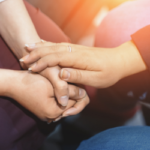Coping with post-pandemic anxiety

Gabriel Somarriba, PsyD
He comforts us in all our afflictions and thus enables us to comfort those who are in trouble, with the same consolation we have received from him. As we have shared much in the suffering of Christ, so through Christ do we share abundantly in his consolation.
2 Corinthians 1:4-5
As the COVID pandemic evolves, some have experienced a sense of personal and social renewal with a return to society, while others with health vulnerabilities or high anxiety may feel a sense of further isolation and division as the world moves forward. Those feeling especially alone can benefit from connecting with a faith tradition or a spiritual practice to assist in coping, along with any other mental-health support they need.
One need look no further than Viktor Frankl’s iconic book Man’s Search for Meaning to see how having belief in a higher purpose is essential to coping through the most difficult trials. His insights endure as humans continue to battle inhumane and high-stress conditions throughout the world. An article published last year in the Journal of International Humanitarian Action surveyed world aid workers and concluded that “a faith-based and spiritual practice can be an effective coping mechanism through processes that are linked to humanity’s primary needs of identity, space for self-care, community, belonging, and connection.”
COVID anxiety
While some of the COVID restrictions that have shaped our lives since March 2020 are being lifted, many anxieties persist. Instead of feeling a sense of joy and exuberance—people running in the streets and setting off fireworks—many of us are confronted with a more cautiously measured vibe. Some might feel like the survivors of an earthquake making their way through the rubble as they pick up the pieces of their shattered lives.
Yes, lives were shattered because of COVID: a record rise in drug and alcohol abuse, an increased number of suicides, crippling unemployment, and hundreds of thousands of deaths caused by the virus itself. The wounds of this pandemic will be around for a long time.
A recent Harvard study revealed that “psychological distress, including depression, anxiety, worry, perceived stress, and loneliness, before COVID-19 infection was associated with an increased risk of long COVID,” according to theHarvard Gazette. “The increased risk was independent of smoking, asthma, and other health behaviors or physical health conditions.”
Further, a study just published in Plus One revealed that racial minorities experienced higher rates of depression and anxiety during the pandemic compared to their white counterparts. The study surveyed 691,473 people in the United States and United Kingdom during 2021 and found that those with Black, Hispanic, Native American, and Asian backgrounds suffered disproportionately from the rest of the population. CNBC reports, “the authors of the study concluded that the mental health impacts of Covid-19 on racial minorities are likely to last for years to come.”
If we needed more reminders of the importance of taking care of our mental and spiritual health and staying connected within our families and communities, it’s fair to say we have them in abundance.
Some of us are more anxious than others and will need our support and encouragement. More importantly, our anxious friends and family members need our kindness and patience—two virtues that are often overlooked in the age of Twitter feuds and online bullying.
Yet, we cannot expect to give effective consolation unless we ourselves feel consoled and secure. That means we must prioritize taking care of our mental and spiritual health and take advantage of the resources available to do so. If you are struggling to make a needed therapy appointment, tell a loved one who can help keep you accountable and follow up. Write a list of the activities that lift you up—whether calling a friend, taking a brisk walk, or listening to an uplifting playlist—and aim to do one per day. If we don’t work toward change in our lives where needed, we will pay for it in how we treat those around us.
In addition to physical wounds of COVID, many people suffer emotional wounds due to great social and political divisions in our communities. As we hope to move forward, we are challenged to consider a forgiving response toward those we disagree with, even if their words have hurt us. Given the stresses the pandemic posed for everyone, it’s possible to say for almost every person and occasion of hurt, “they know not what they do”—and, if that’s possible, forgiveness is possible.
Caring for ourselves to care for others
Another recent report revealed the large emotional burden caretakers carry: 70 percent of nearly 500 junior doctors surveyed in the UK reported feeling severe or extremely severe levels of depression, anxiety, or stress symptoms during the hardest months of the pandemic.
It’s awareness of these stresses that led ICU nurses at the Cleveland Clinic to create art from their traumatic experiences, which were displayed in September. “The ICU is a fast-paced world,” Dr. Jennifer Ramsey, Wellness Officer Repository Institute told 3News in Cleveland. Ramsey noted the importance to take “a moment to pause and reflect on the grief and the trauma and the perseverance and strength that we’ve shown up with as human beings and health care workers.” Among the pieces of art was one called “Fortitude: Resilience in adversity” and showcased a full ICU team attempting to save a COVID patient, with a mosaic of headshots of the unit’s team members as a backdrop.
“They saw a lot of death, they saw colleagues burning out,” Tammy Shella, manager of the art therapy program at the Cleveland Clinic, told 3News, taking a moment to note the “good things that came from that experience” such as “teamwork and resilience and steadfastness.”
As we navigate these stressful times, it’s as good a time as any to remember that a well-anchored boat saves people from drowning, and there are few better anchors available to us than contact with the divine. Most faith traditions encourage believers to encounter the supernatural and eternal truths that lead to peace. For Catholics, this encounter can occur in mental prayer in front of the Blessed Sacrament. For Hindus, it can occur in meditation over passages in the Bhagavad Gita. Whatever one’s faith tradition, meditation and prayer are avenues one can take toward internal peace. From there, we can become better instruments of peace to those around us.



